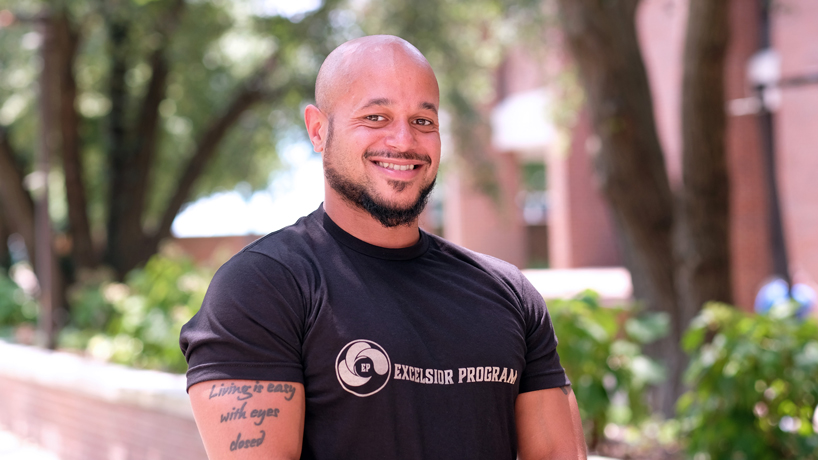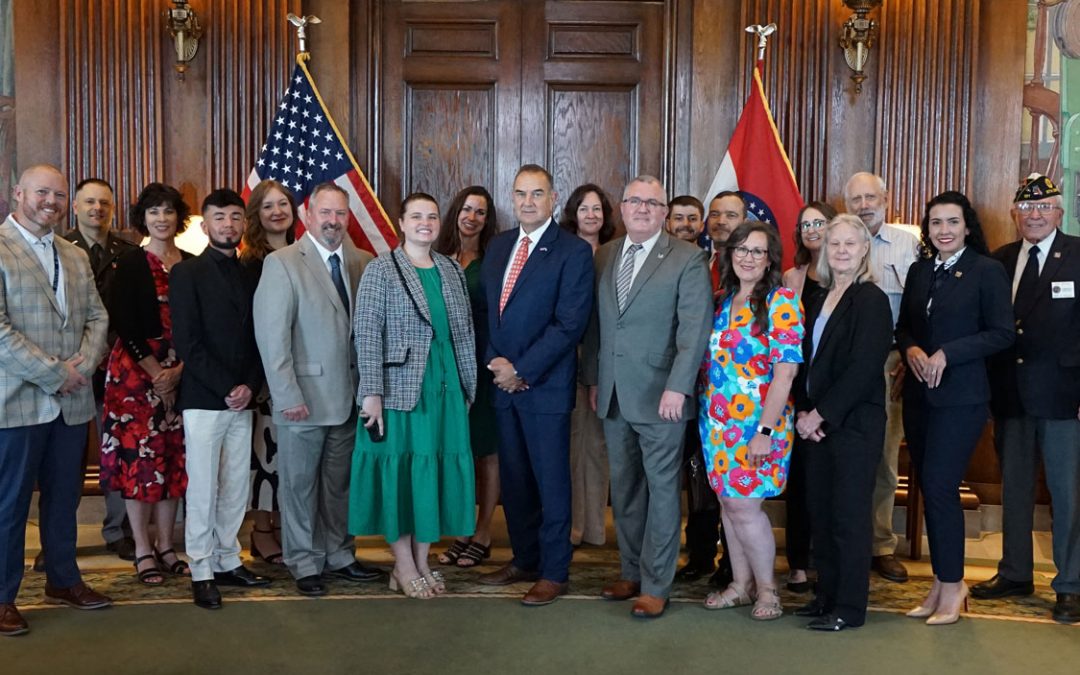
Alumnus Nate Oatis founded the nonprofit Excelsior Program to teach mindfulness and meditation techniques to children ages 12 to 18. Oatis earned his bachelor’s degree with a double major in anthropology and economics in May and will begin pursuing an MSW at the Brown School at Washington University in St. Louis next month. (Photo by August Jennewein)
Nate Oatis can explain his purpose in a single story, one that resides at the forefront of his memory.
It is sure to linger, too, in the minds of people with whom he shares it.
The year was 2017. His wife, Heather, was teaching English language arts to seventh-graders at Yeatman-Liddell Preparatory Middle School on the north side of St. Louis. That year, she lost three of her students to gun violence and another to the juvenile justice system.
That June, Oatis was joining her at the latest funeral – for a 13-year-old known as Little Anthony. He and Heather were seated among the congregation when Anthony’s friend, Maquist, joined them.
“I could feel him fight back and holding these tears,” Oatis said. “A 13-year-old trying to be manly and tough at a funeral for his friend, who succumbed to gun violence.”
Oatis remembers putting his arm around the boy and embracing him.
“He just melted, man, just started sobbing.” Oatis said. “And it absolutely broke my heart.”
It also called Oatis into action.
He went on to found a nonprofit after-school program – the Excelsior Program – aimed at using mixed martial arts as a platform to teach meditation and mindfulness and instill resiliency in at-risk middle and high school students whose lives too often are filled with trauma.
To set it up for success, Oatis has also gone to school, building on his base of knowledge while completing his bachelor’s degree in anthropology and economics at the University of Missouri–St. Louis.
He earned his degree in May. Next month he’ll begin pursuing a master’s degree in social work at the Brown School at Washington University in St. Louis, and he’s eager to get started.
“I feel confident that the Brown School will help me sharpen my tools and, in fact, provide me with a few new tools for my tool belt,” he said. “Learning how to grant write, learning retention techniques, expanding upon my knowledge so that my curriculum is EBP – evidence-based practice. They have all the tools that I need to turn this into something truly substantial.
“Right now, it’s a dinner salad. I need some meat and potatoes.”
Lessons to share
Long before Oatis ever started thinking about an advanced degree, he had a sense that he possessed some lessons he could pass on to kids like Marcus.
His own childhood wasn’t easy.
His father had been an alcoholic and drug addict who could be physically and verbally abusive. He left when Oatis was 10 years old, right after Oatis’ mother was diagnosed with primary biliary cirrhosis, a chronic disease in which the bile ducts in the liver are slowly destroyed.
“As a highly impressionable child, I was responsible for my mom’s health and maintaining her positionality in the world,” he said.
There was a loneliness that accompanied those shifting dynamics, and Oatis found it increasingly difficult to trust others. He learned, instead, to rely on himself, which meant developing a willingness to take action and accept some risk.
With it came some missteps as he made his way through high school and into adulthood.
Oatis became a standout football player and track athlete at Lutheran High School South, but he sometimes found it hard to fit in at the private school in south St. Louis County.
He didn’t have much money growing up with a single, ill parent in a neighborhood near Tower Grove Park. Oatis rode the bus to Lutheran South while many of his classmates rode into the parking lot in new cars. So he got involved in the underground economy, selling drugs so he could afford to buy new shoes or go out to eat with his friends.
It seemed to be working out OK until it came crashing down as Oatis got caught with marijuana near the end of his senior year, costing himself opportunities at athletic scholarships to college and altering the direction of his life.
That’s one of the reasons he thinks he can help kids now.
“I couldn’t imagine being an impressionable 12-, 13-, 14-year-old and having someone like myself to speak to, to guide me,” Oatis said. “I maybe wouldn’t have been a member or participant in the underground economy had somebody steered me on a different path.”
Finding his future
Suddenly unsure of the next steps in his life, Oatis enrolled at St. Louis Community College–Forest Park after graduating high school in 2006 and started studying business. But he lacked motivation for school and didn’t go any further after finishing his associate degree.
Instead, he got into mixed martial arts and began working as a strength and conditioning coach and trainer, a job that proved pretty lucrative for the better part of a decade but ultimately unfulfilling.
Oatis was working with mostly well-to-do clients, but as the years passed, he started feeling like he should be doing more to try to lift less privileged kids from difficult circumstances.
The experience at Anthony’s funeral was really the last thing that pushed him to act. It happened in June 2017, and by that fall, he started filling out the paperwork to apply for tax-exempt status for the Excelsior Program.
Later that school year, Oatis was ready to launch.
Amid setting up the afterschool program, Oatis was also back in the classroom. He had enrolled at UMSL – his wife’s alma mater – to try to earn his degree.
Oatis decided not to continue down his earlier path in business. Instead, he found himself pulled toward anthropology out of an appreciation for the diversity that surrounded him in his Tower Grove neighborhood and an interest in understanding the fractures he saw in the wider St. Louis region.
“I learned so much from the biological aspects to culture and linguistics,” Oatis said. “If anthropology was taught across the board or even at an earlier age, I think we would start to see the gap narrow in regard to xenophobia in our society. If you can articulate why this group of people are very comparable to this group of people, again, you’re bridging that gap and creating some commonality and some common ground.”
Oatis also decided to add a second major in economics, intrigued by the questions it explored about incentives for human behavior and cost-benefit analysis.
Faculty members in both departments, including Susan Brownell, Sheilah Clarke-Ekong and Sarah Lacy in anthropology and Brian Speicher in economics, cultivated his renewed interest in education while sharpening his writing and challenging his ideas and way of thinking.
“I was pretty concrete in my thought process, and to have someone challenge and chip away and try and make that a little bit more malleable, it was greatly appreciated,” Oatis said. “It opened a little perspective.
“We all have this egocentric lens that we live through. We don’t have any other choice but to have more empathy. Then you can understand how to dissect someone else’s argument a little bit better and break things down. It definitely allows me to ask more questions and do less explaining so that I’m able to create a better dialogue.”
That’s helped him learn as well as teach.
Teaching resilience
Oatis finished his first full year of the Excelsior Program in May after about a half year in 2017-18. He’s had about 25 students participate since its inception and built relationships with at least another 35 at Yeatman-Liddell during extra hours he spends at the school.
The program’s Instagram page includes testimonials from a few of the participants.
“When he first met me, I was running around yelling, and he asked if people were listening,” one boy said of Oatis. “He had showed me how to calm down and stuff like that and meditate.”
The boy added: “He’s a good person to talk to.”
Oatis, with some new funding, is looking to purchase assessment tools that can help him gauge the impact the program is having beyond those anecdotes and other evidence.
“There are decreased detentions and suspensions and out-of-school suspensions,” Oatis said. “Peer-to-peer relationships, peer-to-peer communication seem to be improving. Overall classroom behavior has improved. Grades have improved. Tardiness and truancy – decreased all of those things.
“But I’m hoping to kind of quantify the emotional aspects. Are my student participants learning resilience? Are they able to cope better in their environments?”














